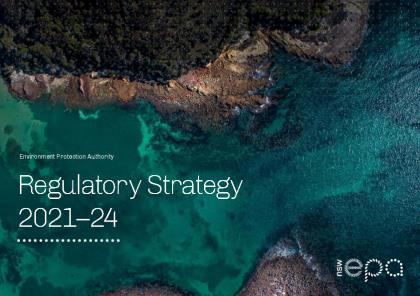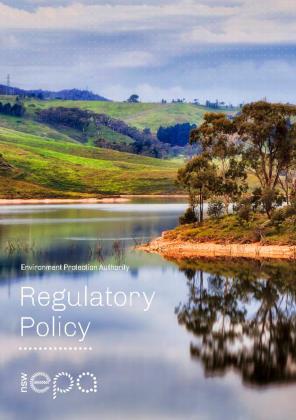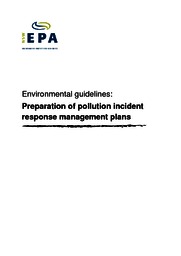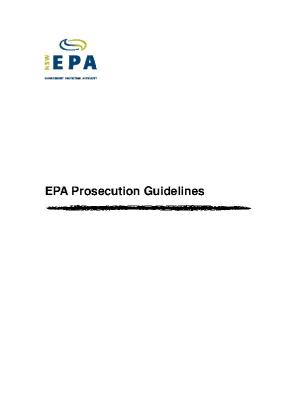The following policies and guidelines set out specific details about how the EPA operates.
Regulatory policies and guidelines
Regulatory strategy
Our Regulatory strategy outlines our purpose, guiding principles and approach to improving the environment and human health outcomes. It sets out what you can expect from us, why we regulate, how we do it and who we work with.
The Regulatory strategy reflects new and existing challenges in environmental regulation and our broader role beyond environmental compliance.
Regulatory policy
Our Regulatory policy sits under the Regulatory strategy and it replaces the prior Compliance policy.
The Regulatory policy guides our regulatory decisions, in response to non-compliance and environmental or human health issues. It describes many of the tools we use and regulatory actions we may take under each of the eight elements of our regulatory approach.
Regulatory and compliance priorities
In the Regulatory and compliance priorities statement 2022-23 we have identified six risks we are prioritising for 2022-23. This is consistent with our Strategic plan.
Prosecution guidelines
Under the Protection of the Environment Administration Act 1991, the EPA is responsible for investigating and reporting on alleged non-compliance with environment protection legislation for the purposes of prosecution or other regulatory action.
The EPA prosecution guidelines set out the factors the EPA takes into account in deciding whether, how and in what court to prosecute offences under the legislation it administers. The guidelines were developed and first published by the EPA Board in 1993, and then revised in 2001, 2004, 2012, 2013, 2020 and 2022.
- Download the EPA prosecution guidelines (PDF 316KB)
Environmental court order guidelines
The EPA guidelines for seeking environmental court orders (2003) deal with sentencing options available for environmental offences, including investigation costs orders, publication orders and environmental service orders. The guidelines discuss the purpose of the orders and the principles the EPA will take into account in deciding whether to seek one or more of the orders.
Guidelines on Enforceable Undertakings
Enforceable undertakings are voluntary, legally binding, written agreements between the EPA and a company that or individual who is alleged to have breached environmental legislation. The agreement includes commitments by the company or individual, in response to an alleged breach, that are designed to improve environmental outcomes and prevent similar incidents occurring in the future.
The EPA uses enforceable undertakings where there has been a serious alleged breach of the legislation. Enforceable undertakings are a
- more serious regulatory response than issuing a warning letter or penalty notice
- less serious regulatory response than prosecution (e.g. where it is possible to incur a criminal conviction)
The EPA's Guidelines on Enforceable Undertakings set out
- what an enforceable undertaking is
- when the EPA is and is not likely to accept an enforceable undertaking
- what an acceptable enforceable undertaking must address
- how you can propose an enforceable undertaking to the EPA and the process for negotiating such an agreement
- how the EPA will monitor compliance with enforceable undertakings
- guidance on negotiating appropriate projects for the benefit of the environment and community
- standard conditions of an enforceable undertaking
Download the Guidelines on Enforceable Undertakings (PDF 547KB)
If you want to propose an enforceable undertaking to the EPA you must submit a completed application form. By submitting an application form you are inviting the EPA to consider an enforceable undertaking with you.
You will need to refer to the guidelines when completing the Application form.
Download the Enforceable Undertaking Application Form (DOC 69KB)
The EPA determines when an enforceable undertaking is an appropriate response by referring to the above policy and these additional and relevant policies:
All enforceable undertakings are made public and placed on the public register.
You can also view the media releases for all enforceable undertakings the EPA has entered into.
Guidelines on EPA use of unmanned aircraft
On 8 November 2017, changes were made to the Protection of the Environment Operations Act 1997 that make it clear that EPA authorised officers can use an unmanned vehicle, vessel or aircraft to carry out their functions.
The EPA’s Guidelines on EPA use of unmanned aircraft (PDF 438KB) seek to strike the appropriate balance between safety, privacy and efficiency. (Unmanned aircraft are commonly referred to as ‘drones’.)
These guidelines outline
- the situations in which the EPA may consider using unmanned aircraft to collect information or assist with its regulatory functions
- the legal frameworks that regulate unmanned aircraft use, which the EPA will abide by
- how the EPA will conduct and manage unmanned aircraft activities
- the systems the EPA has in place to ensure its use of unmanned aircraft is transparent, accountable, and safe, with minimal impact on people’s privacy
- the situations in which the EPA may use unmanned aircraft to enter premises without owner or occupier knowledge
Monetary benefit orders
Under the Protection of the Environment Operations Act 1997 (POEO Act), the EPA can seek a court order to recover the monetary benefits an offender gained from committing an offence (section 249) once they have been found guilty of the offence in the Land and Environment Court. Monetary benefits are the financial advantage an offender gained over their compliant competitors.
The EPA has developed a robust, standardised and transparent process for calculating and recovering monetary benefits in appropriate cases.
- See more about monetary benefit orders
Governance policies and guidelines
Code of Ethics and Conduct
The EPA Code of Ethics and Conduct is applicable to all EPA staff including ongoing, temporary or casual employees, contractors and volunteers. The EPA code is based on the code of ethics and conduct for NSW government sector employees produced by the NSW Public Service Commission.
All EPA staff will conduct their activities in accordance with Government policies and the highest standards of ethical conduct. Our staff are bound by their statutory obligations under the NSW Government Sector Employment Act 2013, which dictates core values for the government sector and the principles that guide their implementation. The Ethical Framework in Part 2 of the Government Sector Employment Act ‘recognises the role of the government sector in preserving the public interest, defending public value, and adding professional quality and value to the commitments of the Government of the day’.
Download: The EPA Code of Ethics and Conduct (PDF 502KB)
Gifts and Benefits Policy
The EPA Gifts and Benefits Policy states how the EPA deals with offers of gifts and benefits. The objectives of this policy are to provide clear and detailed guidance to EPA staff about what is a gift or a benefit and what their obligations are when offered a gift or a benefit, and to ensure staff act within their statutory obligations of the NSW Government Sector Employment Act 2013.
Download: The EPA Gifts, Benefits and Hospitality Policy (PDF 285KB)
Sponsorship Policy
The EPA does not use sponsorship as a primary tool in conducting its core business. However, under some limited circumstances sponsorship may be used to promote and achieve the EPA’s community, environment and business objectives. Partnering with a sponsor allows external participants to contribute towards the EPA’s initiatives.
The EPA Sponsorship Policy (PDF 163KB) outlines the EPA’s policy on providing and receiving sponsorship. You should read this document to determine whether your proposal would be one that could be sponsored by the EPA.
To evaluate sponsorship proposals, the EPA only accepts applications on the EPA Sponsorship Application form (PDF 1.4 MB). This form has been designed to capture all the information required for the EPA to make an assessment as to whether the EPA will provide sponsorship to a third party. Complete this form and send the application to the appropriate EPA Branch (addresses are provided at the end of the form).
Grants Policy
This Grants Policy (PDF 584KB) applies to all Grant Programs funded by the EPA.
The EPA uses Grant Programs to promote and achieve its community, environment and conservation objectives. The partnership between the EPA and a grant recipient allows external participants to contribute and participate in environment and conservation initiatives with the NSW Government.
This policy outlines the EPA’s considerations when establishing and funding Grant Programs.
Privacy Management Plan
The Privacy Management Plan (PDF 387KB) defines personal information and provides details about the privacy principles that the EPA follows when dealing with personal information.
Compliance management framework
The EPA Compliance Management Framework (PDF 94KB) (the Framework) outlines the policies and procedures to be used by the EPA to ensure it complies with its obligations. These are to monitor, assess and report on internal compliance, rectify the causes of non-compliance and evaluate and improve the Framework.
The Framework helps EPA staff to
- show mature compliance conduct that is consistent with the EPA’s values
- comply with a large and fluctuating range of obligations found in legislation, NSW Government policy, cluster policy, EPA policy, contractual terms and conditions that bind the EPA, and standard operating procedures
- apply relevant controls to prevent non-compliance
- act regularly to monitor and detect instances of non-compliance
- manage the risks resulting from non-compliance
- promptly report serious instances of non-compliance to Branch Directors and the Executive
- take corrective action in response to instances of non-compliance
The Framework applies to all EPA staff including ongoing, temporary or casual employees, labour hire (contractors who are working as though they were EPA staff) and seconded staff. It does not apply to contractors who are not representing the EPA but are providing professional services to the EPA. The Framework does not apply to the Board of the EPA.
Fraud and Corruption Control Policy
The objectives of the Fraud and Corruption Control Policy are to
- promote ethical, professional conduct and risk-aware decision making by EPA staff
- protect the reputation of the EPA as an honest and credible regulator
- prevent, detect and respond appropriately to allegations and incidents of fraud or corruption
- assign responsibility for implementing fraud and corruption control arrangements
- protect public finances and public assets
Download Fraud and Corruption Control Policy (PDF 195KB)
Anti-Bullying Policy
The EPA does not accept workplace bullying from any of its staff, in any form. To enforce this strong stance an Anti-Bullying Policy (PDF 102KB) has been developed covering all EPA staff, including staff in ongoing, temporary or casual employment. Workplace bullying can be directed at a staff member or a group of staff members, and can occur inside or outside the place of work.
The policy ensures that EPA staff fulfill their obligations to eliminate or minimise the risk of workplace bullying and provides staff with information on their rights and obligations and how bullying complaints are managed.
Inclusion and Diversity Strategy
The EPA aims to ensure that all of our staff can feel safe, encouraged and supported in their work and recognises the need to address a wide range of diversity and inclusion factors to achieve this.
The EPA’s Inclusion and Diversity Committee has been the driving force behind the development of our Inclusion and Diversity Strategy 2019-21 (PDF 792KB), building on the priorities set out in the Strategic Plan 2017-21.
The strategy will help the EPA achieve its 2021 vision to become an employer of choice, attracting and retaining the most talented people from a diverse range of backgrounds, ethnicities, genders and abilities.
All agencies in New South Wales are required to have a Public Interest Disclosures (PID) Policy under section 42 of the Public Interest Disclosures Act 2022 (PID Act)
Respectful and Inclusive Behaviours Policy
The Respectful and Inclusive Behaviours Policy (PDF 0.7MB) details the EPA's zero tolerance towards workplace bullying, harassment, sexual harassment, victimisation, vilification, and unlawful discrimination. It encourages employees to report these matters promptly so that appropriate action can be taken. It also lays out how investigations into complaints of disrespectful behaviour will be conducted with confidentiality and respect.
Public Interest Disclosures Policy
All agencies in New South Wales are required to have a Public Interest Disclosures (PID) Policy under section 42 of the Public Interest Disclosures Act 2022 (PID Act).
The purpose of the Public Interest Disclosures Policy (PDF 0.7MB) is also to set out the EPA’s responsibilities to ensure such reporting of disclosures that are or may be PIDs are handled in accordance with the PID Act (or, if not a PID , in line with other EPA policies and procedures) and to outline the protections available under the PID Act to makers of PIDS.
The integrity of the EPA relies upon our staff, volunteers, contractors and subcontractors speaking up when they become aware of wrongdoing.
The EPA PID Policy has been developed in accordance with the provisions of the PID Act.
This policy sets out:
- how we will support and protect you if you come forward with a report of serious wrongdoing
- how we will deal with the report and our other responsibilities under the PID Act
- who to contact if you want to make a report
- how to make a report
- the protections which are available to you under the PID Act.





